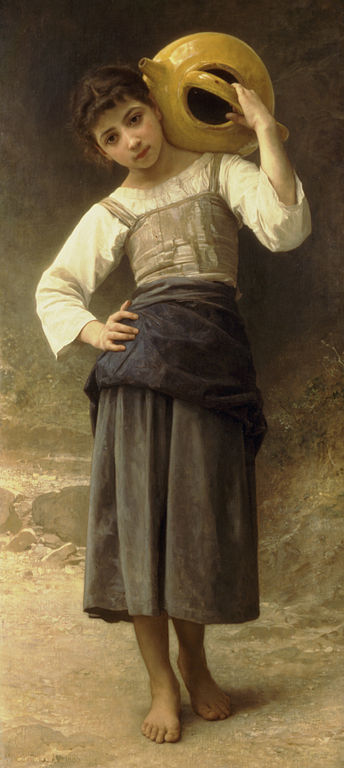Poulenc, Margoton va t’a l’iau
Margoton goes to fetch water with her little jug.
The spring was in a deep hollow, and she fell in.
“Oh Dear,” said Margoton to herself.
 French composer Francis Poulenc (1899-1963) developed a reputation for lighthearted and whimsical compositions, and yet he also composed some very significant large-scale sacred works of the 20th century. That dichotomy shows up frequently in discussions of Poulenc’s works.
French composer Francis Poulenc (1899-1963) developed a reputation for lighthearted and whimsical compositions, and yet he also composed some very significant large-scale sacred works of the 20th century. That dichotomy shows up frequently in discussions of Poulenc’s works.
Three handsome young men pass by.
“Oh Dear,” said Margoton to herself.
The eight Chansons françaises (of which Margoton va t’a l’iau is one) clearly belong to the lighthearted side. Composed at the end of World War II in 1945, these choral settings of French folk materials celebrated French patriotism and a return to the simple joys of life.
What will you give, pretty one, if we pull you out?
Pull me out first, she says, and then we’ll see.
(Clearly Margoton is a better negotiator than the men.)
In the poem, the first and last lines remain the same for every stanza. Poulenc always repeats the first line, “Margoton va t’a l’iau avecque son cruchon.” And each stanza ends with Margoton’s “Oh Dear” lament: “aïe aïe aïe aïe se dit Margoton.” Only the middle line changes as the story advances. Poulenc varies the verses with just a few subtle changes in harmony. The two female voices (soprano and alto) often alternate with the two male voices (tenor and bass) on the first line of the stanza. The middle line is almost always set with both male voices and either alto or soprano. All four voices join in for the last “Oh Dear” line.
After the men pull Margoton to safety she sings them a song. The men had hoped instead “to hold your pretty little heart.” She offers various rebukes in the several versions of the folk song. You can find an English translation of Poulenc’s lyrics here. The performance is by singers from Tawa College in New Zealand.



